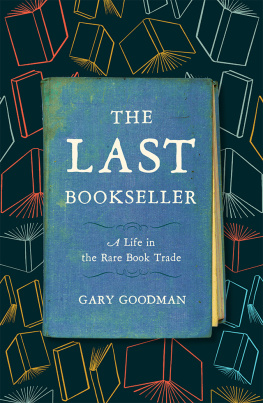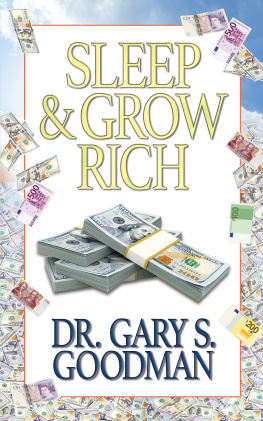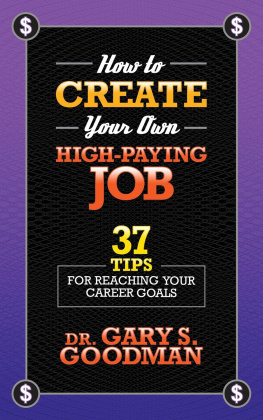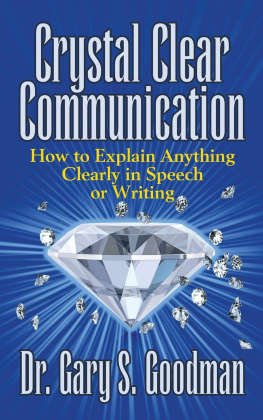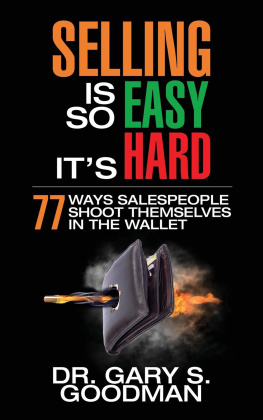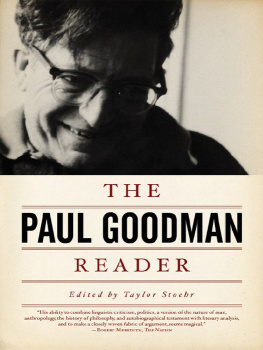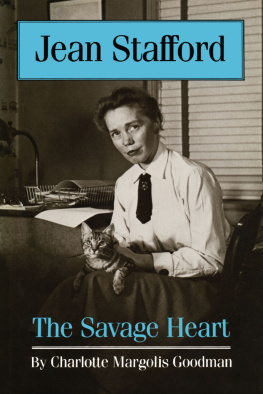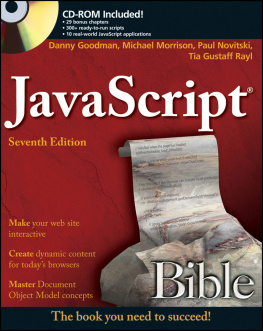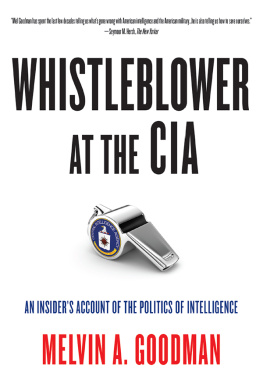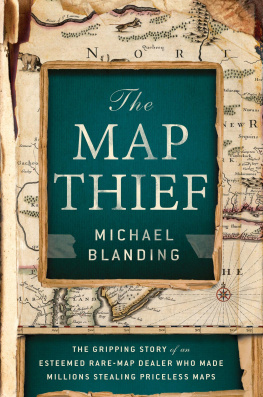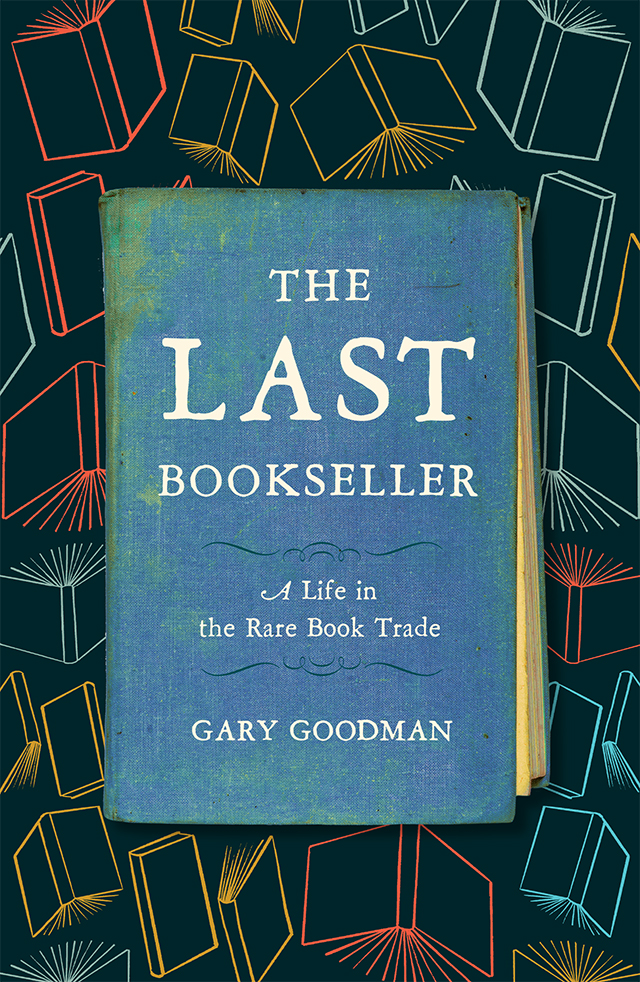
The Last Bookseller
The Last Bookseller
A Life in the Rare Book Trade
Gary Goodman

University of Minnesota Press
Minneapolis London
Photographs are courtesy of the author unless credited otherwise.
Copyright 2021 by Gary Goodman
All rights reserved. No part of this publication may be reproduced, stored in a retrieval system, or transmitted, in any form or by any means, electronic, mechanical, photocopying, recording, or otherwise, without the prior written permission of the publisher.
Published by the University of Minnesota Press
111 Third Avenue South, Suite 290
Minneapolis, MN 55401-2520
http://www.upress.umn.edu
ISBN 978-1-4529-6691-5 (ebook)
LC ebook record available at https://lccn.loc.gov/2021025899.
The University of Minnesota is an equal-opportunity educator and employer.
For my best partners
My dear wife, Mary Pat, and our six children
Meghan, Ben, Nolan, Jonathan, Colin, and Steven
Contents
As long past as 1930, I had a hunch that the talkies would make even the best selling novelist as archaic as silent pictures.
F. SCOTT FITZGERALD, The Crack Up
Okay, so I know Im not the last bookseller. People still sell books. But Im one of the last of a certain kind of bookseller. The kind that for six hundred years rooted around basements, book bins, and bookstores looking for, sometimes, rare books or, more often, secondhand books. They were the hunter-gatherers of the book business, the travelers and pickers, who spent their lives saving books that might otherwise have been lost. They are, now, nearly extinct, driven to ground by the machinesthe cell phones, personal computers, and, especially, the internetthat replaced them at the end of the twentieth century.
The Last Bookseller describes my career as a used and rare book dealer before and during this seismic shift. It is, on one level, a conventional memoir: how I started as a bookseller in 1982; the remarkable, larger-than-life, and sometimes criminal people I met buying and selling books; the unusual books I found and the weird places I found them. But on another level, it is a picture ofand a tribute tothose traveling booksellers who, beginning with the invention of the printing press in 1440, rescued and preserved so many of the rare books and significant manuscripts that survive today.
Most booksellers memoirs are about finding a pamphlet by Edgar Allan Poe at the bottom of a coal chute and selling it for a half a million dollars. Not this one. I stumbled into the book business when I walked into a small used bookstore in East St. Paul, Minnesota, and, despite not knowing a thing about books or business, bought the place. Later, with a couple of partners, I opened another store in the small tourist town of Stillwater, Minnesota, which became so successful and caused so many other booksellers to move there that it became known as a book town. Book townsthats right, towns full of bookswere an actual thing during the roaring 90s of the secondhand book trade.
Richard Booth, the self-proclaimed king of Hay-on-Wye, Wales, and the originator of the official Book Town movement, comes to Stillwater in this story, as does Larry McMurtry, the famous author and secondhand bookseller who created a book town in his hometown of Archer City, Texas. Melvin McCosh, the Minnesota bookseller who sold books from his run-down mansion on Lake Minnetonka, makes an appearance, and so does A. S. W. Rosenbach, the flamboyant rare book dealer who, in the 1930s, bought original manuscripts of books like Ulysses and The Canterbury Tales. Oh, and then theres the book scout who took showers in public restrooms using tubes and garbage bags.
The rare book business in the 1980s and 1990s was also marked by an unusual level of thievery, forgery, and treachery, so several criminals turn up here, including Stephen Blumberg, the St. Paul native who was the most prolific book thief in history; John Jenkins, the Texas bookseller and world-class poker player who killed himself (or was murdered) while standing in the middle of the Colorado River; and Mark Hofmann, the Mormon rare book dealer and forger who blew up two people with pipe bombs to cover up his crimes.
When the internet came along it was, for secondhand booksellers, like a lawyer waking up and discovering that all his clients had gotten law degrees. Before 2000, it took years of experience to become a successful secondhand bookseller. After 2000, anyone in their pajamas with a box of books, a cup of coffee, and a cable connection could buy and sell books online. Between 1990 and 2000 there were nearly four hundred used and rare bookshops in New York City; now, there are fewer than seventy. There were almost fifty in MinneapolisSt. Paul; now, fewer than ten. The internet wiped out many secondhand booksellersand their traditional bookshopsalmost overnight.
So the kind of bookseller Im talking about here is a vanishing breed. Before the last dog dies, I wanted to describe what it was like to make a living in this curious and unconventional business. I traveled enoughthroughout the United States, the United Kingdom, and Canadaand saw enough to know my experiences reflect the changes that occurred in bookselling at the end of the twentieth century and the beginning of the twenty-first. These stories are told from my perspective but are meant to give a realistic picture of this age-old occupation. The booksellers I describe here might not be the last ones, but they are likely the last of their kind.
Secondhand, used, rare, and, less often, the fancier antiquarian are used interchangeably here. They all refer to previously owned books and so are, in essence, the same thing. Some books just cost more than others.
Travis McDade writes in Thieves of Book Row, A remarkable number of the memoirs of booksellers are basically anecdote delivery devices... rich with stories of acquisitions and near misses... This is true of most of these types of books simply because that is what people want to read.
Distinct from independent booksellers, who sell new books and whose bookstores are the last line of defense against the internet juggernaut. Their stores are also under siege, but so far the internet hasnt figured out how to replace them.
In the middle of my life, I found myself in a dark wood, for the straight way was lost.
DANTE, The Divine Comedy
On a March morning in 1982 I walked into F. Fithian, Books, a small secondhand bookstore on Arcade Street in East St. Paul, Minnesota. The name was above the front door in crooked wooden letters, and in the window a handmade sign announced that the store was going out of business. The place wasnt much bigger than a rich persons walk-in closet. I had never been in a used bookstore before in my life and was struck by the musty smell and the chaos, confined, as it was, to such a small space.
The walls were lined with cheap particleboard bookcases. There were toppled stacks of books on the floor, and more booksnovels from the turn of the last century, self-help books, beat-up paperbacksspilled from broken boxes. Prominently displayed, face out, on plastic stands were a few newer childrens books. Sections in the store were marked by paper scraps thumbtacked to the shelves, the subjects written in thin ballpoint pen. The fiction section was full, with books stacked from floor to ceiling, but other sections had only five or ten books, with signs like Italian Renaissance or Eastern Philosophy tacked below them. Beyond the cases, behind a counter made of plywood and two-by-fours, sat a small man whose name, I learned, was Frank.
Next page
